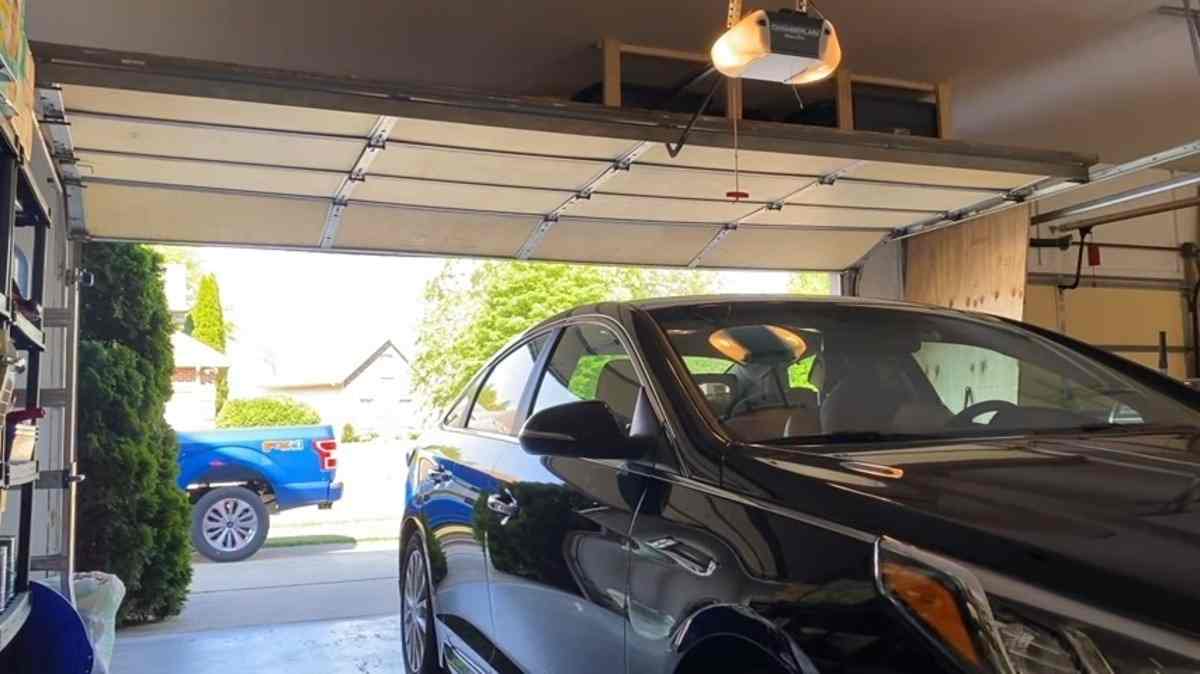Affiliate Disclosure: We may earn money or products from the companies mentioned in this post.
Garage door sensors are a very important component in garage door sensors, they are the ones that prevent damage to property and also prevent injury or worse. Garage door sensors not lighting up could be caused by different factors.
In this article, we’ll extensively discuss why your garage door sensors are not lighting up and also possible causes and solutions on how to rectify the issue.
Why Are My Garage Door Sensors Not Lighting Up?
If your garage door sensors are not lighting up, this could be due to a few different issues. The most common cause is the sensors being misaligned. This occurs when the sensors are not properly aligned with each other, preventing the infrared beam from passing between them.
Another potential issue could be due to a buildup of dirt and debris that is blocking the sensors. Here’s a list of possible causes of why your garage door sensors aren’t lighting up.
1. Obstructed Signal Transmission
This can be a reason why your garage door sensors are not lighting up. This can occur when something is blocking the line of sight between the sensors, such as dirt, debris, or other foreign objects.
Additionally, the sensors could have become dislodged from the garage door frame, which could be preventing them from transmitting signals properly.
2. Dirty Sensors
Dirty sensors could be the primary reason your garage door sensor is not lighting up. Over time, dirt, dust, and debris can build up on the sensor preventing it from detecting motion.
However, this issue can be easily rectified with a few minutes of cleaning. To clean the sensor, use a damp cloth to carefully wipe away any dirt or debris that may be obscuring the lenses.
3. Sensor Eye Misalignment
Sensor eye misalignment is a common issue when it comes to garage door sensors not lighting up. This misalignment can occur when the sensors are bumped during installation or when the door is bumped during use.
If the sensors are not correctly aligned with each other, one or both of the sensors may not be able to register the other sensor and the light will not illuminate.
To fix this issue, the sensors should be adjusted until they are correctly aligned. If they are still not lighting up after adjustment, they may need to be replaced.
4. Busted Electrical Components
If you notice that your garage door sensors are not lighting up, it could be a result of the busted electrical component. This could be caused by a number of factors, such as a power surge, a short circuit, or a blown fuse.
It is also important to ensure that any repairs or replacements are completed by a qualified electrician and that the safety regulations are followed. Failure to do so could result in further damage or even injury.
5. Remote Control Issues
A faulty or bad result could be why your door sensors are no longer lighting up. A variety of issues, such as a dead battery, faulty programming, or a problem with the remote control itself can cause this.
6. Moisture Around The Sensors
Moisture around the sensors can be a common cause of garage door sensors not lighting up. The presence of moisture around the sensors can lead to various problems, including corrosion and malfunction of the sensors.
Can I Replace My Garage Door Sensors?
Yes, it is possible to replace your garage door sensors. However, it is recommended to have a professional handle the installation of your new garage door sensors, as it requires a certain level of experience and expertise to make sure it is done correctly.
On the other hand, if you choose to install your new garage door yourself, you should check the compatibility of the new sensors to ensure that they are compatible with your garage door opener. Additionally, you should check the safety guidelines provided with the sensors to make sure the installation is done safely and properly.
Step-By-Step On How To Replace Your Garage Door Sensors
Replacing garage door sensors is an important task to ensure your garage door is functioning properly. It is important to note that this process should only be done by someone who is familiar with the garage door system and has the proper tools to complete the job
Here’s a step-by-step method on how to replace your garage door sensor
Step 1: Disconnect The Power
It is essential to ensure proper safety precautions when replacing garage door sensors. Before beginning the process of replacing your garage door sensors, you should unplug the power of the garage door.
This should be done by either unplugging the garage door opener or switching the power off at the circuit breaker. Doing this will ensure that the garage door does not move unexpectedly during the replacement process, which could lead to potential damage or injury.
Step 2: Remove The Faulty Sensors
After disconnecting the garage door from its power source, carefully remove the faulty sensors from the door and frame and then replace them with new garage door sensors. Ensure to take extreme care when handling the sensors, as any damage caused to them may interfere with the door’s performance.
Additionally, ensure that the sensors are securely placed in the door and frame before reconnecting the power. Once the garage door is powered on, test the sensors to ensure they are correctly working.
Step 3: Connect The Garage To Its Power Source And Test The New Sensors
After replacing the sensor, reconnect the garage door opener to its power source and test the sensors. Make sure that the sensors are working perfectly before closing them.
What Does It Mean When Garage Door Sensors Start Blinking?
A blinking light indicates that the sensor has detected an obstruction, or that the signal between the sensor and the door has been disrupted. Typically, when a garage door is blinking green, then it’s in perfect condition, on the other hand, it starts blinking red, then there’s a fault and it needs attending to.
The color of the blinking light on your garage door sensor can vary, depending on the specific model and manufacturer.
Can Garage Door Openers Work Without Sensors?
Yes, garage door openers can work without sensors. However, in most cases, garage door openers cannot work without sensors, as the sensors are responsible for detecting when something is blocking the path of the garage door and automatically reversing it to prevent damage or injury.
However, some garage door openers can be used without sensors as long as the door is not in danger of closing on an object or person. In these cases, the door can be closed manually.
Ultimately, while it is possible to use a garage door opener without sensors, it is not recommended as it can be a safety hazard.
Are Garage Door Opener Sensors Universal?
There’s no definitive answer to whether garage door opener sensors are universal. Generally, most openers use the same type of rolling code technology, and the majority of sensors are compatible with one another. However, there are some expectations, so it is important to check the compatibility of the opener and sensor before getting them.
Also, they may be compatibility issues with older models and newer models, so it’s best to check with the manufacturer of the product to ensure compatibility. It is also important to note that while most sensors are compatible, they may need to be configured to work with a specific opener.
How To Prevent Garage Door Sensors From Damage?
Ensuring that your garage door sensors are well maintained is key to preventing any damage, as this will help to ensure that your garage door operates efficiently and safely. Here are some tips to help protect your garage door sensors:
1. Inspect The Sensors Regularly
Regularly check the sensors on your garage door and look for any signs of damage or wear. If you see anything irregular, have a professional repair the sensors to avoid further damage.
2. Keep The Sensors Clean
Make sure to keep the sensors clean, as dirt or debris can impede or block the sensors from functioning properly. Use a soft cloth and a mild cleaner to remove any dust or dirt. Do not use abrasive materials as this could cause damage to the sensors.
3. Protect Them From Water
Water can damage the sensors, so be sure to keep them away from any water or watery source.
4. Make Sure They Are Aligned
Make sure the sensors are properly aligned with each other. If they are misaligned, it can cause problems with the door’s operation.
5. Use Caution When Working On The Door
If you need to perform any maintenance on the garage door or the sensors, be sure to follow the manufacturer’s instructions carefully to avoid damaging the sensors.
How Long Do Garage Door Sensors Last?
Garage door sensors are designed to last for a long time and can provide reliable performance for many years. Depending on the type of sensor, lifespan can vary greatly. High-quality sensors are typically designed to last for 10 years or more, while lower-quality sensors may last for only five years or less
However, the longevity of garage door sensors might depend on other factors, such as the environment in which they are installed, the quality of the sensors, and the amount of use that the door receives. If you use your garage door frequently, then the sensor may need to be replaced more often than if it is used less.
What Makes Garage Door Sensors Fail?
There are a few common causes of garage door sensor failure, including power outages, corrosion, and improper alignment. Common causes of garage door sensor failure include the sensors becoming misaligned, debris obstructing the sensors, or corrosion of the sensor components due to weather conditions.
Additionally, the garage door sensors may malfunction due to improper installation, an incorrect power supply connection, an incorrect voltage, or a faulty wiring system. It is important to properly maintain your garage door sensors in order to ensure that they remain in optimal condition and function correctly.
Can Garage Door Sensors Be Affected By Sunlight?
Yes, garage door sensors can be affected by sunlight. This is because sunlight contains infrared radiation, which can interfere with the electronic signals of a garage door sensor.
This can cause the sensors to malfunction, leading to the door not closing properly or the opener not functioning correctly. Additionally, if your garage door is exposed to direct sunlight for prolonged periods of time, this can cause the sensors to become overheated and malfunction. It is wise to consider installing sun shields or blinds to help protect the sensors and other components of the door from too much exposure to the sun.
Conclusion
Garage door sensors not lighting up cool as a result of different factors. It could be because they’re not properly aligned. To fix this, first, check to see if the sensors are clean. If they’re dirty, clean them with a soft cloth.
Next, check to see if the sensors are properly aligned. The sensors should be aligned so that the infrared beam is level with the ground. If the sensors are properly aligned, but the beam is still not lighting up, it could be because the batteries are dead.


